Good morning!
Greetings in the name of Father, Son, and Holy Spirit.
Praying for you, your family, your community, and the rest of the world. Right now, the whole world is suffering because of the Coronavirus (COVID-19). Let’s pray together to God, Our Ever-Loving Father, His mercy and protection on all, and God’s healing on those who are infected by the Coronavirus. We all believe God’s grace and love rest on all who look upon Him every moment with faith in Him.
For this God is our God forever and ever; he will be our guide even to the end. (Psalm 48:14)
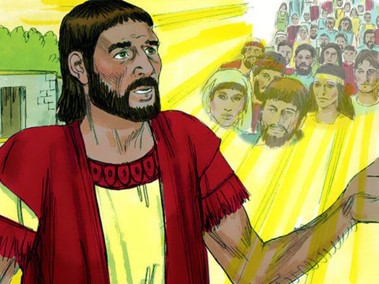
We call Abraham the father of faith for all believers. But it took a long time for Abraham to be the Abraham known to be as the father of faith.
Abraham met God and heard God’s promise, and Abraham believed like a child without any doubts. (His name was also Abram instead of Abraham. But we use Abraham for both cases. We will have a time when and how he was renamed.) He left his native countries and his relatives, which were his social safety net at that time. Then Abraham followed God without knowing where he went. Abraham had a unique faith, which cannot be easily found anytime in history and now. God loved Abraham’s child-like faith obeying God without any doubts. (Here is one more mystery. The faith of Abraham came from God as a gift to Abraham.)
Then he said, “I tell you the truth, unless you turn from your sins and become like little children, you will never get into the Kingdom of Heaven. (Matthew 18:3)
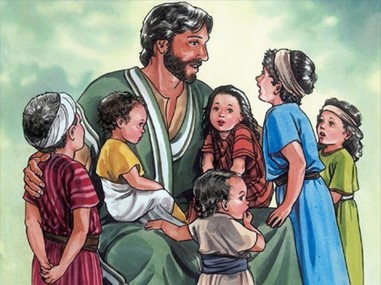
His faith made a great first step, but Abraham had to go through the journey of faith to be fully mature in faith in Him. Abraham, in faith, followed God and built an altar wherever he went and worshipped God by calling His name. Abraham lived a God-centered life and settled in Canaan, the Promised Land.
However, the world did not let him alone. A great famine came, which forced him to move down to Egypt for food. Abraham thought that his move to Egypt would solve all of his problems met in the promised land, but it turned out to be not true. As arriving in Egypt, he felt fear of being killed by Egyptians to take away his wife from him. He lied to protect his life, and he was saved. But his wife was taken to Pharaoh because Pharaoh thought that he took Abraham’s sister per his lie. This disaster made Abraham return to the Lord with a humble and confessing heart. God heard his prayer, and God punished Pharaoh. Pharaoh returned his wife and expelled Abraham from Egypt.
The sacrifice you desire is a broken spirit. You will not reject a broken and repentant heart, O God. (Psalm 51:17)
Throughout the journey down to Egypt, Abraham learned from God about Him – how faithful to His promise to Abraham. Abraham made a side step, but God was always there with Abraham. Abraham was completely stuck and asked God’s help, God answered. Indeed, God provided more than Abraham expected. Abraham became richer than before he went down to Egypt. Pharaoh gave lots of gifts to Abraham for his wife because Pharaoh thought that he was getting Abraham’s wife as Abraham’s sister. God made Abraham richer using the wealth of Pharaoh. As promised to Abraham, God faithfully blessed Abraham wherever he went.
Whatever is good and perfect is a gift coming down to us from God our Father, who created all the lights in the heavens. He never changes or casts a shifting shadow. (James 1:17)
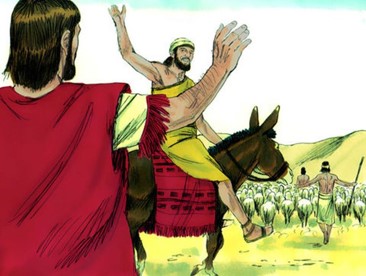
Then Lot, his nephew, suddenly brought a life challenge to Abraham. Lot wanted to leave Abraham because his servants could not coexist with those of Abraham due to the limited size of the land. Abraham hurt a lot because he loved Lot as if his son. He gave the best land and blessed Lot who was leaving Abraham. Abraham learned God’s character from his wrongdoing of leaving the promised land to Egypt, and he replicated what he learned to Lot. It was the first victory of Abraham in faith. Abraham was growing in faith in Him.
The land where Lot settled looked like heaven with green pasture and rolling hills, but it was a land of hostility. A big war broke out, and Lot became a captive of the war. Abraham, as soon as hearing this news, called his people and chased down the king who was the most powerful, and rescued Lot. Abraham couldn’t battle against the most powerful king if he had no faith in God. Abraham fought in faith and prevailed. Yes, God gave Abraham a great victory. This is the second victory of Abraham in faith. On the way back home, Melchizedek, the king of Salem and a priest of God Most High, came out and greeted with bread and wine. Abraham gave 1/10 of all the goods he had recovered.
However, Abraham was still fighting against one fundamental question: how could he become a great nation without his own son? He struggled since he met God. He gave a deep thought, again and again, to rationalize God’s promise by bridging the impossible gap between God’s promise and the reality with no son and with his barren wife. This bothered him day and night. He could not take off this struggle. Finally, his heart became unsettled because of this impossibility. If we were Abraham, how would we have responded?
Abraham finally rationalized God’s promise. His solution was to make Eliezer of Damascus, a servant of his household, the heir of all his wealth and including God’s promise. By declaring Eileser as his heir, God’s promise would be fulfilled as promised –making Abraham a great nation. Abraham was so happy because he could rationalize God’s impossible promise. Hmm. Then did Abraham really believe God’s promise in faith? It is a good question to ask ourselves. Are we really believe God’s promise in faith?
Then God appeared told Abraham in a vision and said to him,
“Do not be afraid, Abram, for I will protect you, and your reward will be great.” (Genesis 15:1b)

God knew Abraham’s struggle and his fear of an uncertain future. When Abraham left his native country and his relatives without knowing where he went, i.e., the greatest uncertainty of his future, Abraham did not rationalize God’s promise, but he believed like a child. What did happen to Abraham?
This clearly tells about the truth of one’s faith. Nobody, even Abraham, could have an absolute and unchanging faith that only Jesus had before the cross. When Abraham’s faith was shaken, Abraham took a route of rationalizing his faith. It is very sad to say, but even at this moment, many of us rationalize God’s promise and fall like Abraham. Our faith is neither a knowledge that can be rationally explained nor an earthly truth that can be rationalized with earthly wisdom. Our faith is beyond anything that we see, touch, and even imagine because it is of God, not of the world.
Abraham told his own story. It was completely rationalized by Abraham instead of believing God’s promise like a child. God gently said to Abraham,
“No, your servant will not be your heir, for you will have a son of your own who will be your heir.” (Genesis 15:4b)
God knew Abraham’s struggle. Instead of analyzing Abraham’s fault and unbelief with Abraham, God prepared an encouragement for him. Yes, this is one excellent example of who God is. Like a parent who already prepared an encouragement for a child who has been struggling for a long time about a parent’s promise that he or she could not rationalize because it is far beyond his or her ability, God prepared an encouragement that was specifically designed for Abraham and at the specific moment.
God took Abraham outside and showed the countlessly many stars sparkling against the clear night sky. Then God said,
“Look up into the sky and count the stars if you can. That’s how many descendants you will have!” (Genesis 15:5b)
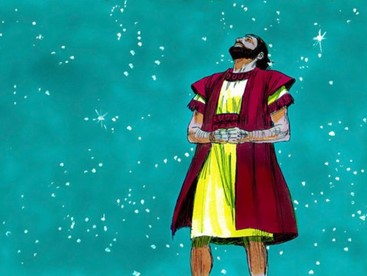
Abraham was awestruck by what he saw. Abraham had never seen that many stars, which were displayed before his eyes. Of course, it was God’s encouragement specially designed for Abraham that night. Abraham counted and counted, but he could not count them all because they were too many. Before the awesome scene, Abraham let down all of his efforts to rationalize God’s promise because he saw God’s promise with his own eyes. All of his doubts were melt away like ice under a hot summer sun. His heart was, instead, filled with thanksgiving, hope, and assurance that nobody could give because all directly came from God because God wanted to encourage Abraham.
And Abram believed the LORD, and the LORD counted him as righteous because of his faith. (Genesis 15:6)
Yes, Abraham believed again like a child. God counted Abraham as righteous. Indeed, this is the highest commendation from God. This is the reason why we call Abraham the father of faith.
Then God told Abraham,
“I am the LORD who brought you out of Ur of the Chaldeans to give you this land as your possession.” (Genesis 15:7b)
Although Abraham was counted as righteous by God, Abraham’s faith had not been perfected yet. The true triumphant moment of his true victory in faith was yet to come. Abraham passed the big exam before God with a mark of “being counted as righteous.” Excellent, but it was not the final exam yet. God gave another exam by telling “I will give you this land as your possession.” How did Abraham respond? Let’s see together.
But Abram replied,
“O Sovereign LORD, how can I be sure that I will actually possess it?” (Genesis 15:8b)
What? Abraham was just counted as righteous due to his faith – believing God’s promise despite the impossibility of being a great nation with no son and with his barren wife. Now, Abraham was questioning how to possess the land that God promised to give him? Which one is easier to believe God’s promise that was impossible in any logic and rationales or that was plausible — at least remotely possible?
Abraham was completely overwhelmed when he saw God’s promise being displayed before his own eyes, and he could completely forget his doubts and rationalization on God’s impossible promise. However, for this time, Abraham wanted to know the actual and detailed process of how God’s promise of possessing the land would be fulfilled.
This gives us an important spiritual lesson. Sometimes we are truly blessed spiritually (not with earthly wisdom, such as rationalization) by receiving God’s gift of knowing God’s plan and even understand it spiritually. However, this does not mean we suddenly become a holy person who has all knowledge, wisdom, and secret of God in faith. No. This means that we are just one more step closer to God. Our journey on earth in Him is still ahead of us and never ends, which is a mystery but certainly a blessing to us.
By the way, our spiritual walk gets deeper into God, paradoxically, we realize how sinful we are rather than getting holier than before. It should be the other way around, shouldn’t it? Then why? As we know more about God and His righteousness without any darkness at all, we know how dark we are especially before the absolute light of God. The degree of our darkness is inversely proportional to the degree of the purity and brightness of our God and His holiness and righteousness. In other words, even the slightest sin in our heart casts a clear mark of a dark shadow on God’s holiness due to the absolute purity of God’s light. Thus, the Bible tells
As the Scripture says, “Non on is righteous – not even one. (Romans 3:10)
Yes, there is no one, even one single human being ever lived, is righteous. All sinners. Apostle Paul when he got to the maturity of his faith at his old age confessed that
This is a trustworthy saying, and everyone should accept it: “Christ Jesus came into the world to save sinners”—and I am the worst of them all. But God had mercy on me so that Christ Jesus could use me as a prime example of his great patience with even the worst sinners. Then others will realize that they, too, can believe in him and receive eternal life. (1 Timothy 1:15-16)
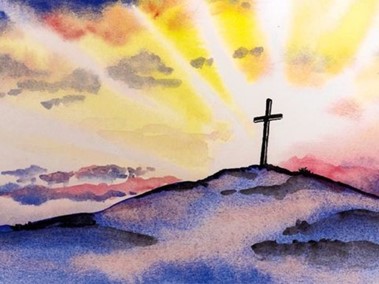
Apostle Paul professed that he was the worst sinner. Was Apostle Paul was the worst sinner at that time? Apostle Paul always prayed for churches and fellow believers while praising God and singing hymns even in jail. Anyone saw Apostle Paul would say he was the best Christian ever. However, when Apostle Paul truly experienced God and His absolute holiness, he saw the deep and dark shadow of his sins in his heart cast on God’s holiness although they were far less than our sins in our hearts. To Apostle Paul, the ugly and dark shadow was getting taller and thicker as the pure light of God was getting stronger as he got close to God. Therefore, Apostle Paul could not stop saying – I am the worst sinner. Yes, he saw this heartbreaking reality acting in his heart and he lamented, but as we all know, his lamentation becomes the hope to all. Apostle Paul concludes that the worst sinner, himself, could be saved by Jesus Christ. If so, was there anyone who could not be saved? Yes, all could be easily saved because he was the worst among all. As a result, paradoxically, God’s salvation was offered to all. Yes, believing is the only requirement to be saved, not money, not dedication, not good works, not charity. Only saves our faith in Christ Jesus — accepting Jesus as our personal savior.
Abraham’s question about the evidence and direct proof. This was a clear manifestation that he still needed to grow in faith. Faith does not need evidence because it itself is the evidence, and it does not ask for assurance because it itself is the assurance. Faith is what we hope for and what makes us continue hoping for although we don’t see any pieces of evidence with our physical eyes. This is the reason why the world cannot subdue or defeat our faith. Our faith is stronger than anything else on earth, and the world is not worthy of faith. After all, faith is not of the world, but of God, which is beyond anything that we can see or imagine. And faith is God’s gift given to us according to His infinite goodwill.
Faith shows the reality of what we hope for; it is the evidence of things we cannot see. (Hebrews 11:1)
God, who is always faithful and full of mercy, provided an opportunity for Abraham to be truly connected with Him alone in a quiet place. God asked Abraham,
“Bring me a three-year-old heifer, a three-year-old female goat, a three-year-old ram, a turtledove, and a young pigeon.” (Genesis 15:9b)
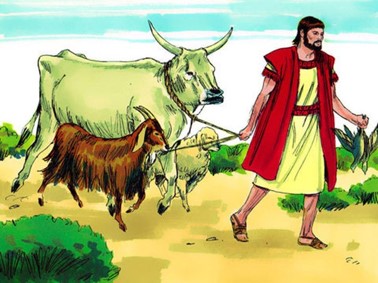
Per God’s request, Abraham offer sacrifices before God. That is, God let Abraham, who wanted physical evidence, perform the physical activity of worshipping God. Abraham had to spend the rest of the day carefully preparing and presenting his offering to God as directed. However, nothing had happened. Abraham kept watching over his offerings. Some vultures swooped down to eat the carcasses, but Abraham chased them away.
As the sun was going down, Abraham, who was completely exhausted, fell into a deep sleep, and a terrifying darkness came down over him. Abraham did everything he could, and he was surrounded by the terrifying darkness in solitude. So far, nothing happened although he did everything that he could as God asked to do and waited. As Abraham fell asleep, God came to Abraham. God revealed the details of how the land would be possessed by Abraham and his descendants,
“You can be sure that your descendants will be strangers in a foreign land, where they will be oppressed as slaves for 400 years. But I will punish the nation that enslaves them, and in the end they will come away with great wealth. (As for you, you will die in peace and be buried at a ripe old age.) After four generations your descendants will return here to this land, for the sins of the Amorites do not yet warrant their destruction.” (Genesis 15:12b-16)
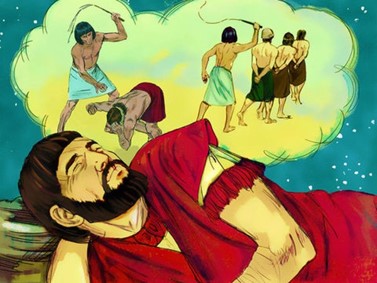
What a shocking answer from God! If we were Abraham, could we understand God’s answer? Being salve for 400 years in a foreign land. God would punish the nation and in the end, Abraham’s descendant would come away with great wealth. Abraham wanted to know, and God answered. It was a difficult food to shallow. Indeed, God also spared him by only exposing that Abraham would not be hurt by God’s answer.
Why did God give the difficult answer to Abraham? First, God loved Abraham. Second, God saw Abraham’s faithfulness till the terrifying darkness fell in solitude. Yes, God revealed the truth to Abraham. The reality was hard to swallow. The occupation of this land by Abraham’s descendants followed the painful oppression as slaves for 400 years in a foreign land. God also told that He counted the days of the current occupants of the land due to the increasing sins of the Amorites. Surely, there was a lot more to tell, but God had gone to the point that Abraham could shallow.
God is far beyond us. We all want to know what God will do. But we cannot understand if God gives us all the details. And some of the future might be so dreadful like being slavery for 400 years in a foreign land. God is the master of the universe. He also watches over us and others such as Amorites. There is no way to understand what God does for all things together as God has been doing since the creation. Additionally, let’s assume that we know what God will do. Even so, we have no ability to alter His plan because it is beyond our domain. We cannot overrule God’s sovereignty. We are just His creatures, but among the creatures, we are His children loved by God. What else can we ask more?
Abraham could not understand all that God said and what God meant, but he held tight to one part – his descendants would return to this land to occupy. He was comforted. As Abraham was getting comforted, God sent down fire on the sacrifice set by Abraham. Abraham saw a smoking firepot and a flaming torch pass between the halves of the carcasses. What a relief! Finally, Abraham saw his sacrifice was accepted by God. He was truly comforted by the fire. In the terrifying darkness, Abraham was fully restored by God.
God, who is the most merciful Father, again came to Abraham. Abraham was watching the burning sacrifice, and he was getting the warmth of God from the fire and comforted by the light amid the terrifying darkness. The terrifying fear left Abraham. Then God gently spoke to Abraham, and made a covenant with Abraham,
“I have given this land to your descendants, all the way from the border of Egypt to the great Euphrates River— the land now occupied by the Kenites, Kenizzites, Kadmonites, Hittites, Perizzites, Rephaites, Amorites, Canaanites, Girgashites, and Jebusites.” (Genesis 15:18b-21)

For this time, God was very specific about the territory. This also included the challenge that Abraham’s descendants would have to overcome – displacing ten (yes, ten) nations before occupying the land. One nation would come from one father, Abraham, and the nation would occupy the land occupied by ten nations. This was the covenant of God made with Abraham. One to ten. It was impossible, but Abraham believed because Abraham’s faith had been getting mature to shallow a hard food of being slaved for 400 years and God’s counting days for Amorites, etc. Abraham could now see all (not fully but partially thought), himself, his descendants, and other nations, such as Amorites. How about our faith? Our faith is just for our own self only? Or our families also? Or our community? Or our nation? Or the world that God had created?
Abraham’s faith was slowly and steadily built up by God with His kindness and merciful hand. Through the journey with God, Abraham was getting to know more about God. Finally, Abraham met God in a solitary place in the terrifying darkness of night. When he was most vulnerable, God came to him. Indeed, God waited for the moment. Then Abraham asked a lot, and God gladly answered including something beyond his comprehension. Yes, Abraham could not understand all of God’s answers about the future of his descendants, but he believed, which pleased God.
Abraham certainly walked with God all circumstances whether he was victorious in faith or he was in doubt. God was always with Abraham, and He was kind and faithful to Abraham. Why? Abraham was God’s beloved child whom God madly loved. Nothing could be in the way between God and Abraham. Even ten nations and the mighty Egyptian king could not hinder the love of God flowing from God’s throne to Abraham and his descendants. Rather all became God’s instruments as designed to guide and protect Abraham and his descendants throughout the journey on earth. God’s plan for maturing Abraham’s faith was on track, and God did not stop working on Abraham till he truly became the father of faith for all believers. Amazingly and most importantly to us, Abraham faithfully followed God under all circumstances. What a beautiful walk of Abraham in God!
God offers the same beautiful walk with God to each of us today even at this moment. The choice is up to each of us.

“Come, all you who are thirsty, come to the waters; and you who have no money, come, buy and eat! Come, buy wine and milk without money and without cost. (Isaiah 55:1)
